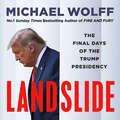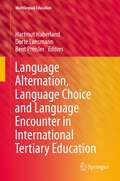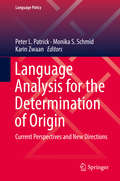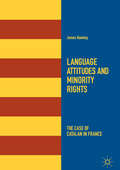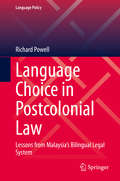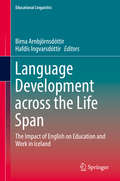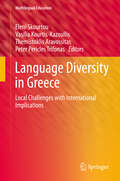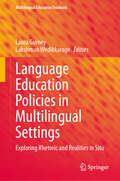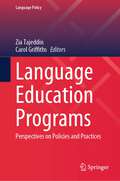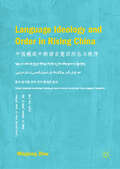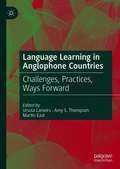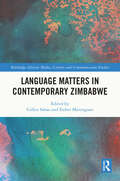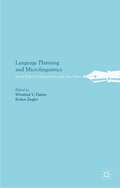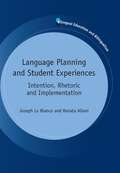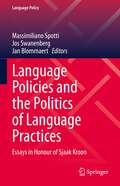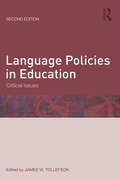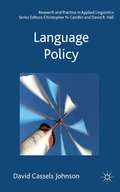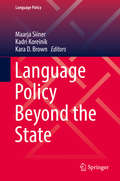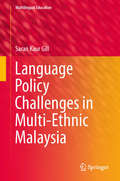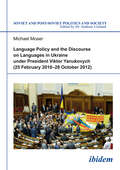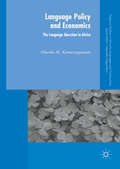- Table View
- List View
Landslide: The Final Days of the Trump Presidency
by Michael WolffIncludes an introduction read by Michael Wolff, as well as archival recordings of speeches made by Rudy Giuliani, Sidney Powell, and Donald Trump.'We won. Won in a landslide. This was a landslide.'President Donald J. Trump, 6 January 2021Politics has given us some shocking and confounding moments but none have come close to the careening final days of Donald Trump's presidency: the surreal stage management of his re-election campaign, his audacious election challenge, the harrowing mayhem of the storming of the Capitol and the buffoonery of the second impeachment trial. But what was really going on in the inner sanctum of the White House during these calamitous events? What did the president and his dwindling cadre of loyalists actually believe? And what were they planning?Drawing on an exclusive and wide range of sources who took part in or witnessed Trump's closing moments, Michael Wolff finds the Oval Office more chaotic and bizarre than ever before, a kind of Star Wars bar scene. At all times of the day, Trump, hunched behind the Resolute desk, is surrounded by schemers and unqualified sycophants who spoon-feed him the 'alternative facts' he hungers to hear - about COVID-19, Black Lives Matter protests, and, most of all, his chance of winning re-election.In this extraordinary telling of a unique moment in history, Wolff gives us front row seats as Trump's circle of plotters whittles down to the most enabling and the least qualified - and the president overreaches the bounds of democracy, entertaining the idea of martial law and balking at calling off the insurrectionist mob that threatens the hallowed seat of democracy itself.Michael Wolff pulled back the curtain on the Trump presidency with his globally bestselling blockbuster Fire and Fury. Now, in Landslide, he closes the door on the presidency with a final, astonishingly candid tale.
Language Alternation, Language Choice and Language Encounter in International Tertiary Education
by Bent Preisler Dorte Lønsmann Hartmut HaberlandReflecting the increased use of English as lingua franca in today's university education, this volume maps the interplay and competition between English and other tongues in a learning community that in practice is not only bilingual but multilingual. The volume includes case studies from Japan, Australia, South Africa, Germany, Catalonia, China, Denmark and Sweden, analysing a range of issues such as the conflict between the students' native languages and English, the reality of parallel teaching in English as well as in the local language, and classrooms that are nominally English-speaking but multilingual in practice. The book assesses the factors common to successful bilingual learners, and provides university administrators, policy makers and teachers around the world with a much-needed commentary on the challenges they face in increasingly multilingual surroundings characterized by a heterogeneous student population. Patterns of language alternation and choice have become increasingly important to the development of an understanding of the internationalisation of higher education that is occurring world-wide. This volume draws on the extensive and varied literature related to the sociolinguistics of globalisation - linguistic ethnography, discourse analysis, language teaching, language and identity, and language planning - as the theoretical bases for the description of the nature of these emerging multilingual communities that are increasingly found in international education. It uses observational data from eleven studies that take into account the macro (societal), meso (university) and micro (participant) levels of language interaction to explicate the range of language encounters - highlighting both successful and problematic interactions and their related language ideologies. Although English is the common lingua franca, the studies in the volume highlight the importance of the multilingual resources available to participants in higher educational institutions that are used to negotiate and solve their language problems. The volume brings to our attention a range of important insights into language issues found in the internationalisation of higher education, and provides a resource for those wishing to understand or do research on how language hybridity and multilingual communicative practices are evolving there. Richard B. Baldauf Jr., Professor, The University of Queensland
Language Analysis for the Determination of Origin: Current Perspectives And New Directions (Language Policy #16)
by Monika S. Schmid Peter L. Patrick Karin ZwaanThis comprehensive, up-to-date volume reports on current practices and use of Language Analysis for the Determination of Origin (LADO). Readers will find chapters on how it is done, where it is used, how it is used, and learn about recent developments on the use of LADO reports in judicial practice, and current controversies in the field. LADO is a highly controversial topic, and a relatively new branch of forensic linguistics that is used by most European and some non-European governments. When asylum seekers cannot submit documentary proof of their origin, their language can be analysed in order to assess whether their linguistic profile is in accordance with their stated origin. Around 10,000 such language analyses take place annually. This volume is based on the series of meetings of the Language and Asylum Research Group held between 2010 and 2012 and convened by the editors, and offers a state-of-the art perspective from researchers, practitioners, policymakers and stakeholders working on or with LADO.
Language Attitudes and Minority Rights: The Case Of Catalan In France
by James HawkeyThis book presents a detailed sociolinguistic study of the traditionally Catalan-speaking areas of Southern France, and sheds new light on language attitudes, phonetic variation, language ideologies and minority language rights. The region’s complex dual identity, both Catalan and French, both peripheral and strategic, is shown to be reflected in the book’s attitudinal findings which in turn act as reliable predictors of phonetic variation. The author’s careful discursive analysis paints a clear picture of the linguistic ideological landscape: in which French dominates as the language of status and prestige. This innovative work, employing cutting-edge mixed methods, provides an in-depth account of an under-examined language situation, and draws on this research to propose a number of policy recommendations to protect minority rights for speakers of Catalan in the region. Combining language attitudes, sociophonetics, discourse studies, and language policy, this will provide an invaluable reference for scholars of French and Catalan studies and minority languages around the world.
Language Choice in Postcolonial Law: Lessons from Malaysia’s Bilingual Legal System (Language Policy #22)
by Richard PowellThis book discusses multilingual postcolonial common law, focusing on Malaysia’s efforts to shift the language of law from English to Malay, and weighing the pros and cons of planned language shift as a solution to language-based disadvantage before the law in jurisdictions where the majority of citizens lack proficiency in the traditional legal medium. Through analysis of legislation and policy documents, interviews with lawyers, law students and law lecturers, and observations of court proceedings and law lectures, the book reflects on what is entailed in changing the language of the law. It reviews the implications of societal bilingualism for postcolonial justice systems, and raises an important question for language planners to consider: if the language of the law is changed, what else about the law changes?
Language Development across the Life Span
by Birna Arnbjörnsdóttir Hafdís IngvarsdóttirThis book offers insights from a seven-year study into the impact of English as an International Language at a national level, from the effect of rich English input on a previously monolingual people’s linguistic repertoire to its effect on the situated language use demanded of speakers who find themselves in a new linguistic environment for which they have not been prepared. The changes described in the book have occurred in a speech community that identifies strongly with the local language, but finds itself increasingly having to use another language to perform daily functions in education and work. Findings describe how the official language and educational policies have not addressed this new linguistic ecology of Iceland. The findings of these studies have larger international practical, educational, empirical, and theoretical implications and should be relevant to anyone interested in in the impact of English as an International Language.
Language Diversity in Greece: Local Challenges with International Implications (Multilingual Education #36)
by Peter Pericles Trifonas Themistoklis Aravossitas Vasilia Kourtis-Kazoullis Eleni SkourtouThis volume explores how linguistic and cultural diversity in Greece, caused by various waves of emigration and immigration, has transformed Greek society and its educational system. It examines the country’s current linguistic diversity, which is characterised by the languages of immigrants, repatriates, refugees, Roma, Muslim minorities, and Pomaks as well as linguistic varieties and dialects; and how schools and the state have designed and implemented programmes to deal with the significant educational challenges posed by these culturally and linguistically diverse groups. In this regard, the book takes into account the nature and evolution of Greek society; Greece’s traditional role as a labour-exporting country with a long history of migration to other countries; and major political, economic and social developments, such as the collapse of communism, the opening of borders in Eastern Europe, and the influx of immigrants from Muslim countries.
Language Education Policies in Multilingual Settings: Exploring Rhetoric and Realities in Situ (Multilingual Education Yearbook)
by Laura Gurney Lakshman WedikkarageThe volume provides grounded and contemporary insight into multilingual education from diverse perspectives – stemming from the authors' epistemic, cultural and geographic positioning around the world in different educational milieu – and will give both academic and practitioner audiences an up-to-date picture of multilingual education in the early 2020s. Multilingual education policies are continually implemented, re-evaluated and debated around the world, from primary to tertiary education. Fundamentally, however, educational policies manifest in classroom practice; the language envisaged in policy becomes the languaging of practice as teachers, learners and stakeholders negotiate educational curricula together. Internal and external forces – from resourcing to the Internet, to broader events such as pandemics and changes in government – shape the landscapes in which policies are enacted. The volume is extending the themes of the Multilingual Education Yearbook series in line with current developments in theory, research and practice. As such, this book provides a wealth of information to practitioners (teachers and teacher educators), researchers in applied linguistics and language education, postgraduate students in the field of applied linguistics, and policymakers.
Language Education Programs: Perspectives on Policies and Practices (Language Policy #34)
by Carol Griffiths Zia TajeddinThis book delves into the realm of effective language education programs, examining them from both macro and micro-policy-making perspectives. It unravels the distinguishing features of exemplary language programs and explores how these programs are implemented in diverse international contexts. The book comprehensively explores various facets of language education programs, encompassing well-crafted language education policies, robust curriculum and syllabus design, impactful teaching materials, effective approaches to English for specific purposes (ESP), English as a medium of instruction (EMI), content and language integrated learning (CLIL), and English as a Lingua Franca (ELF)-informed instruction. The book also delves into fruitful school/institute-university partnerships, the judicious use of technology, strategies for teacher recruitment and professional development, as well as efficient policies for learner assessment, among other topics of significance. The contributions within this book are firmly grounded in data, incorporating findings from empirical studies. The insights provided draw upon valuable data obtained from a range of diverse contexts in which effective language education programs have been implemented.
Language Ideology and Order in Rising China
by Minglang ZhouThis text considers contemporary China’s language ideology and how it supports China as a rising global power player. It examines the materialization of this ideology as China’s language order unfolds on two front, promoting Putonghua domestically and globally, alongside its economic growth and military expansion. Within the conceptual framework of language ideology and language order and using PRC policy documents, education annals, and fieldwork, this book explores how China’s language ideology is related to its growing global power as well as its domestic and global outreaches. It also addresses how this ideology has been materialized as a language order in terms of institutional development and support, and what impact these choices are having on China and the world. Focusing on the relationship between language ideology and language order, the book highlights a closer and coherent linguistic association between China’s domestic drive and global outreach since the turn of the century.
Language Learning and Teaching in Missionary and Colonial Contexts: L'apprentissage et l'enseignement des langues en contextes missionnaire et colonial (Languages and Culture in History)
by Dan Savatovsky Mariangela Albano Thị Kiều Ly Phạm Valérie SpaëthThis volume assembles texts dedicated to the linguistic and educational aspects of missionary and colonial enterprises, taking into account all continents and with an extended diachronic perspective (15th–20th centuries). Strictly speaking, this “linguistics” is contemporary to the colonial era, so it is primarily the work of missionaries of Catholic orders and Protestant societies. It can also belong to a retrospective outlook, following decolonization. In the first category, one mostly finds transcription, translation, and grammatization practices (typically, the production of dictionaries and grammar books). In the second category, one finds in addition descriptions of language use, of situations of diglossia, and of contact between languages. Within this framework, the volume focuses on educational and linguistic policies, language teaching and learning, and the didactics that were associated with them.
Language Learning in Anglophone Countries: Challenges, Practices, Ways Forward
by Martin East Ursula Lanvers Amy S. ThompsonThis edited book focuses on the state of language learning in Anglophone countries and brings together international research from a wide range of educational settings. Taking a contextual perspective on the language learning crisis currently facing Anglophone countries, the authors examine systemic challenges, real-world practices, and broader cultural trends that have an impact on the uptake of modern foreign languages in different Anglophone settings. This book will be of interest to scholars working in applied linguistics and language education, particularly those with a focus on educational policy and Global English.
Language Matters in Contemporary Zimbabwe (Routledge African Media, Culture and Communication Studies)
by Esther Mavengano Collen SabaoSpeaking to a broader global preoccupation with the state of languages and language development, this book considers issues surrounding the diverse languages, linguistic communities, and cultures of Zimbabwe.Reflecting on Shona, Xitsonga, Sotho, Xhosa, Tjwao, Nambya, IsiNdebele, Nyanja, Tshivenda, English and Braille, the book uncovers both the internal and external factors that impact language structures, language use and language ideologies across the country. The book considers how colonial legacies and contemporary language domination and minoritisation have led to language endangerment. It considers the fate of communities whose languages are marginalised and, in the process, poses questions on what can and should be done to preserve Zimbabwean languages. The authors' offerings range across subjects as diverse as music, linguistic innovation, education, human rights, literature, language politics and language policy, in order to build a rich and nuanced picture of language matters in the country.Coming at a critical moment of increasing mobility, migration, cultural plurality and globalisation, this book will be an important resource for researchers across African literature, linguistics, communication, policy and politics.
Language Planning and Microlinguistics
by Winifred V. Davies Evelyn ZieglerWhilst earlier studies of language planning and of standardisation have tended to study macro processes such as top-down language revitalisation campaigns or language polices at government level, this volume is in line with more recent work aimed at bridging the macro and the micro levels by examining how the two interact and influence each other. The aim of the volume as a whole is to contribute to a better understanding of the motivations underlying language users' decisions to adopt or resist language norms and policies of various kinds in their daily life. The individual chapters cover seven countries - the Czech Republic, Denmark, France, Germany, Japan, Luxembourg and Switzerland - and deal with different sociolinguistic constellations, ranging from communities dealing with variation within one language to those looking for ways to manage a multilingual repertoire.
Language Planning and Student Experiences
by Joseph Lo Bianco Renata AlianiThis book is a timely comparison of the divergent worlds of policy implementation and policy ambition, the messy, often contradictory here-and-now reality of languages in schools and the sharp-edged, shiny, future-oriented representation of languages in policy. Two deep rooted tendencies in Australian political and social life, multiculturalism and Asian regionalism, are represented as key phases in the country's experimentation with language education planning. Presenting data from a five year ethnographic study combined with a 40 year span of policy analysis, this volume is a rare book length treatment of the chasm between imagined policy and its experienced delivery, and will provide insights that policymakers around the world can draw on.
Language Policies and the Politics of Language Practices: Essays in Honour of Sjaak Kroon (Language Policy #28)
by Jan Blommaert Massimiliano Spotti Jos SwanenbergThis edited volume consists of chapters celebrating the career of scholar Sjaak Kroon, who has produced ground-breaking work in the field of ethnography of education, immigrant minority language teaching and language politics. The chapters cover the use of immigrant minority languages in education and the development of policies at all levels and across the globe in this sometimes over-policed field. It particularly focuses on language policy analysis in which both the top-down institutional and the bottom-up ethnographic dimensions are blended, and in which globalization is the main macro-perspective. The chapters describe sensitive tools for investigating, unravelling and understanding the grey space connecting formal language policies to informal politics and practices of language on the ground.
Language Policies in Education: Critical Issues
by James W. TollefsonHow do language policies in schools create inequalities among learners? How do policies marginalize some students while granting privilege to others? How do language policies in education serve the interests of dominant groups within societies? How can linguistic minorities further their interests through attempts to change language policies in schools? This new edition of Language Policies in Education takes a fresh look at these enduring questions at the heart of fundamental debates about the role of schools in society, the links between education and employment, and conflicts between linguistic minorities and "mainstream" populations. Reflecting developments in language policy since the publication of the first edition in 2002, all chapters are original and substantial contributions to the study of language policy and exemplify major theories and research methods in the field. Chapter authors are major scholars in language policy and critical language studies. The case studies, international in scope, present cutting-edge analyses of important language policy debates in countries around the world.
Language Policy
by Bernard SpolskyLanguage policy is an issue of critical importance in the world today. In this 2003 introduction, Bernard Spolsky explores many debates at the forefront of language policy: ideas of correctness and bad language; bilingualism and multilingualism; language death and efforts to preserve endangered languages; language choice as a human and civil right; and language education policy. Through looking at the language practices, beliefs and management of social groups from families to supra-national organizations, he develops a theory of modern national language policy and the major forces controlling it, such as the demands for efficient communication, the pressure for national identity, the attractions of (and resistance to) English as a global language, and the growing concern for human and civil rights as they impinge on language. Two central questions asked in this wide-ranging survey are of how to recognize language policies, and whether or not language can be managed at all.
Language Policy
by David Cassels JohnsonA detailed overview of the theories, concepts, research methods, and findings in the field of language policy is provided here in one accessible source. The author proposes new methodological, theoretical, and conceptual directions and offers guidance for doing language policy research.
Language Policy Beyond the State
by Maarja Siiner Kadri Koreinik Kara D. BrownLanguage Policy beyond the State invites readers to (re-)consider the ways language policy is constituted, taken up, and researched if we look within and past the state. Contributors to this edited volume draw attention to language policy as always in the making, focusing on agency, on-the-ground practices, and ideologies. The chapters of the book reveal how simultaneous, and at times contradicting, language policies exist within a state and explore the complex roles played by families, businesses, educational institutions, and media in generating and appropriating these policies. By moving away from language policy analysis concerned primarily with how official state policies address well-defined language problems, some of the contributions of the volume highlight how the problems themselves can be ideological artifacts or are discursively constructed in language ideological debates that are provoked by changes in the geopolitical situation in the region. Using qualitative and descriptive research, the book uses Estonia as a setting to examine the ways historic and contemporary populations navigate language policies in both local and transnational spaces. As a whole, the collection speaks eloquently and powerfully to current efforts to understand and map the ways multiple institutions and individuals--not just the state--play an active role in forming and taking up language policies.
Language Policy Challenges in Multi-Ethnic Malaysia
by Saran Kaur GillSet in Malaysia, this book encompasses language and cultural policy challenges that many other multi-ethnic nations currently have to address. The people of Malaysia constitute a diverse ethnic, linguistic and cultural population and one of the continuing challenges is the development and establishment of the Malaysian people's ethnic, national and global cultural identities. This challenge is evident in the journey of language and cultural policy from the post-independence period to the 21st century; a period of over 50 years. The book highlights political, socio-cultural, economic and knowledge economy factors as they impact on decisions made by the government with regard to language policy in the various educational systems. It examines decisions made on the selection of the national language, the medium of instruction in educational systems, the varying changes in language policy for the field of science and technology and the maintenance and sustenance of minority languages.
Language Policy and Discourse on Languages in Ukraine Under President Viktor Yanukovych
by Michael MoserDeclared the country's official language in 1996, Ukrainian has weathered constant challenges by post-Soviet political forces promoting Russian. Michael Moser provides the definitive account of the policies and ethno-political dynamics underlying this unique cultural struggle.
Language Policy and Discourse on Languages in Ukraine Under President Viktor Yanukovych: (25 February 2010–28 October 2012) (Soviet and Post-Soviet Politics and Society #122)
by Michael MoserDeclared the country's official language in 1996, Ukrainian has weathered constant challenges by post-Soviet political forces promoting Russian. Michael Moser provides the definitive account of the policies and ethno-political dynamics underlying this unique cultural struggle.
Language Policy and Economics: The Language Question in Africa
by Nkonko M. KamwangamaluThis book addresses the perennial question of how to promote Africa's indigenous languages as medium of instruction in educational systems. Breaking with the traditional approach to the continent's language question by focusing on the often overlooked issue of the link between African languages and economic development, Language Policy and Economics argues that African languages are an integral part of a nation's socio-political and economic development. Therefore, the book argues that any language policy designed to promote these languages in such higher domains as the educational system in particular must have economic advantages if the intent is to succeed, and proposes Prestige Planning as the way to address this issue. The proposition is a welcome break away from language policies which pay lip-service to the empowerment of African languages while, by default, strengthening the stranglehold of imported European languages.
Language Policy and Language Planning: From Nationalism To Globalisation
by Sue WrightThis revised second edition is a comprehensive overview of why we speak the languages that we do. It covers language learning imposed by political and economic agendas as well as language choices entered into willingly for reasons of social mobility, economic advantage and group identity.
